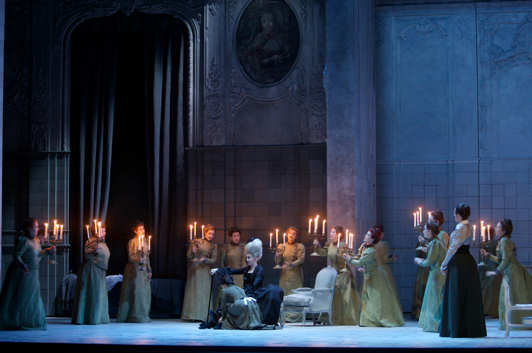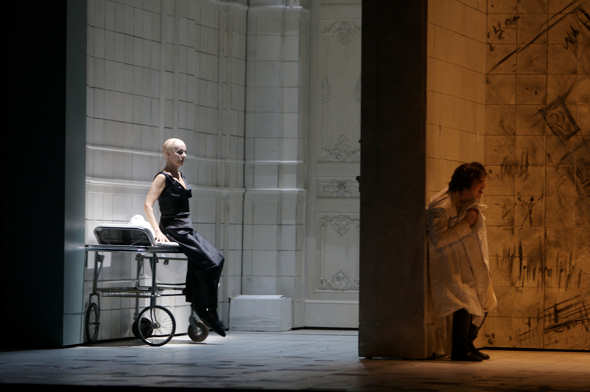Other Links
Editorial Board
- Editor - Bill Kenny
- London Editor-Melanie Eskenazi
- Founder - Len Mullenger
Google Site Search
SEEN
AND HEARD INTERNATIONAL OPERA REVIEW
Tchaikovski, The Queen of Spades:
Soloists,
Orchestra
and Chorus du Capitole Conductor: Tugan Sokhiev.
Théâtre du Capitole de Toulouse. 3. 2.2008 (JMI)
At
30 years old, the
New Production - Capitole deToulouse.
Director: Arnaud Bernard.
Sets: Alessandro Camera.
Costumes: Carla Ricotti.
Lighting: Patrick Mèeüs.
Cast:
Hermann: Vladimir Galouzine.
Lisa:
Barbara Haveman.
Countess: Raina Kabaivanska.
Prince Yeletsky: Vladimir Chernov.
Count Tomsky: Boris Statsenko.
Polina:
Varduhi Abrahamnyan.

Arnaud Bernard seems to me one of the most promising directors of
the new generation whose other work in Toulouse I have greatly
enjoyed in the past, particularly his wonderful L'Elisir d'
Amore from last season. Sadly, on this occasion his work was
less interesting and produced a sensation of “Déjà vu”. Bernard
builds the opera around the figure of a Hermann who is insane,
which makes a lot of sense, since we can all agree that the
character is indeed not exactly normal mentally speaking. What
happens though is that, by extending this idea even to the sets
and costumes, the production reminds me too much to what Lev Dodin
did in 1999 in La Bastille: Dodin presented the opera as a flash
back in Hermann’s mind , while he lived in a mental hospital,
which does in fact follow Pushkin's novel. The feeling of lack of
originality also arises during the Pastoral, represented as a
pantomime between a married couple in the 60s, whose privacy is
invaded by colour TV set salesmen. This is also a reminder of what
Peter Konwitschny did in his Don Carlos production in
Vienna and Barcelona during the ballet music. Both the Russian and
German directors were booed by the public. The stage direction is
remarkable though, with interesting ideas like changing the
barracks scene to a morgue, giving more impact to the Countess's
revelation of reveal her secret. The sets consist mostly of white
walls that accentuate Hermann's more unreal aspects. Something
similar can be said of costumes which are all in pale colours,
except the Countess, who is always dressed in black. Despite good
lighting work, in summary, this production of a the more than
promising Arnaud Bernard, turned out to be slightly disappointing.

Vladimir Galouzine was an impressive Hermann in all senses who
simply has no rival in this repertoire. He has great stamina and
a real baritonal middle range, but with an outstanding and
powerful high register. His identification with the deranged
Hermann was total and this was a memorable performance.
Dutch soprano Barbara Haveman is a regular in this theater, where
she has sung Jenufa, Micaela and, recently, Donna Elvira. In
general. I always considered her as a decent soprano without too
much interest, but as Lisa she gave her most convincing
performance so far. She was helped very well by the director,
offering a most credible portrayal and singing with
expressiveness and a voice perfectly suited to the needs of the
role.
The veteran baritone Vladimir Chernov was good Prince Yeletsky,
singing his great aria in the first act with taste. It is
peculiar what happens with to this very good singer. During the
first half of the 90s he was almost the baritone of reference in
the main Verd repertoire but lately, his presence in big opera
houses has been infrequent, despite the fact that the voice is in
good shape (perhaps a little less forceful than before) and his
age (54 years) is still more than reasonable for a baritone.
The great Raina Kabaivanska was the Countess - or The Queen of
Spades who gives title to the opera. Without a doubt she has been
one the great glories of the second half of the last century and
she still maintains her bearing and dignity on stage and is an
outstanding actress. Vocally, her state leaves something to be
desired, as happens with so many Countesses but the important
thing is that nobody should go to opera to criticize older glory:
instead we should respectfully show her admiration and
appreciation for her long and magnificent career.
Russian baritone Boris Statsenko was not too brilliant a Count
Tomsky but Armenian mezzo soprano Varduhi Abrahamnyan was a good
Polina, both in her duet with Lisa and in her own first act aria.
And among the secondary roles Romanian Balint Szabo deserves much
attention as Sourine and there were no failures among rest -
Vladimir Solodovnikov (Tchekalinski), Carolin Masur (Governess),
and Elena Poesina (Macha and Chloé).
As I said before, there was a packed house with an audience that
gave a triumphant applause to Vladimir Galouzine and Tugan
Sokhiev. There were very warm receptions too for Haveman, Chernov
and, of course, for Raina Kabaivanska.
José M.
Irurzun
Pictures © Patrice Nin
Back
to Top
Cumulative Index Page
